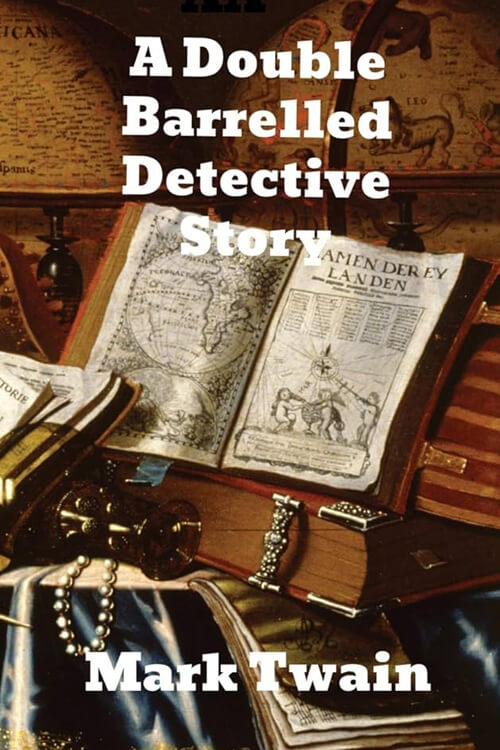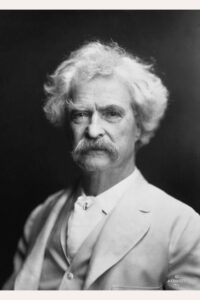
A Double Barrelled Detective Story
The first scene is in the country, Virginia, in 1880. There has been a wedding between a handsome young man of slender means and a wealthy young girl—a case of love at first sight and a precipitate marriage, a marriage bitterly opposed by the girl’s widowed father.
Jacob Fuller, the bridegroom, is twenty-six years old and is of an old but unconsidered family that had, by compulsion, emigrated from Sedgemoor. Everybody said for King James’s purse’s profit—some maliciously, the rest merely because they believed it. The bride is nineteen and beautiful. She is intense, high-strung, romantic, immeasurably proud of her Cavalier blood, and passionate in her love for her young husband.
For its sake, she braved her father’s displeasure, endured his reproaches, listened with unshaken loyalty to his warning predictions, and left his house without his blessing, proud and happy in the proofs she was thus giving of the quality of the affection that had made its home in her heart.
The morning after the marriage, there was a sad surprise for her. Her husband put aside her proffered caresses and said:
“Sit down. I have something to say to you. I loved you. That was before I asked your father to give you to me. His refusal is not my grievance—I could have endured that. But what he said of me to you is a different matter. You needn’t speak; I know quite well what they were; I got them from authentic sources. Among other things, he said that my character was written in my face; that I was treacherous, a dissembler, a coward, and a brute without a sense of pity or compassion: the ‘Sedgemoor trade-mark,’ he called it—and ‘white-sleeve badge.’ Any other man in my place would have gone to his house and shot him down like a dog. I wanted to do it and was minded to do it, but a better thought came to me: to put him to shame, to break his heart, to kill him by inches. How to do it? Through my treatment of you, his idol! I would marry you, and then—Have patience. You will see.”
From that moment onward, for three months, the young wife suffered all the humiliations, all the insults, all the miseries that the diligent and inventive mind of the husband could contrive, save physical injuries only. Her strong pride stood by her, and she kept the secret of her troubles. Now and then the husband said, “Why don’t you go to your father and tell him?” Then he invented new tortures, applied them, and asked again.
Read or download Book
Mark Twain
Samuel Langhorne Clemens (November 30, 1835 – April 21, 1910), known by the pen name Mark Twain, was an American writer, humorist, essayist, entrepreneur, publisher, and lecturer. He was praised as the “greatest humorist the United States has produced,” William Faulkner called him “the father of American literature.”
Biography.
His novels include The Adventures of Tom Sawyer (1876) and its sequel, Adventures of Huckleberry Finn (1884), with the latter often called the “Great American Novel”. Twain also wrote A Connecticut Yankee in King Arthur’s Court (1889) and Pudd’nhead Wilson (1894) and co-wrote The Gilded Age: A Tale of Today (1873) with Charles Dudley Warner. Twain was raised in Hannibal, Missouri, which later set the setting for Tom Sawyer and Huckleberry Finn.
He served an apprenticeship with a printer early in his career and worked as a typesetter, contributing articles to his older brother Orion Clemens’ newspaper. Then, he became a riverboat pilot on the Mississippi River, providing him with the material for Life on the Mississippi (1883). Soon after, Twain headed west to join Orion in Nevada. He referred humorously to his lack of success at mining, turning to journalism for the Virginia City Territorial Enterprise.
He first achieved success as a writer with the humorous story “The Celebrated Jumping Frog of Calaveras County,” which was published in 1865; it was based on a story that he heard at Angels Hotel in Angels Camp, California, where he had spent some time as a miner. The short story brought him international attention. He wrote both fiction and non-fiction. As his fame grew, he became a much sought-after speaker. His wit and satire, both in prose and in speech, earned praise from critics and peers, and Twain was a friend to presidents, artists, industrialists, and European royalty. Although Twain initially spoke out in favor of American interests in the Hawaiian Islands, he later reversed his position, becoming vice president of the American Anti-Imperialist League from 1901 until he died in 1910, coming out strongly against the Philippine-American War and colonialism.
Twain earned a great deal of money from his writing and lectures but invested in ventures that lost most of it. One is the Paige Compositor, a mechanical typesetter that failed because of its complexity and imprecision. He filed for bankruptcy in the wake of these financial setbacks but, in time, overcame his financial troubles with the help of Standard Oil executive Henry Huttleston Rogers. Twain eventually paid all his creditors in full, even though his declaration of bankruptcy meant he was not required to do so. He was born shortly after the appearance of Halley’s Comet and predicted that his death would accompany it as well, dying a day after the comet was at its closest to Earth.






